最新商务英语BEC初级UNIT1
剑桥商务英语初级Unit1a
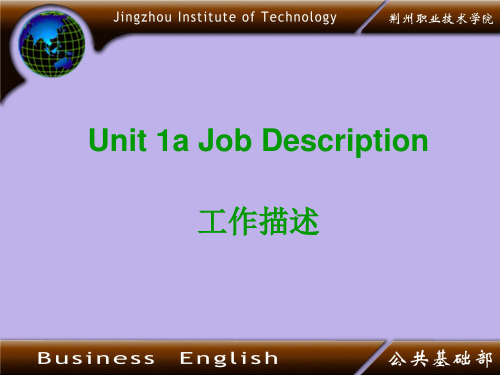
Business Card
accountant 会计 The accountant described his work to the sales staff. 那个会计向营业部的职员介绍了自己的工作情况.
Conversation 4
• TK: Tell me, does your consultancy work with big companies? • BL: No, we do the accounts for small and medium-sized companies. • TK: Ah, I see. Do you have clients in London? • BL: Some but not many. Most of our clients are in Reading.
Conversation 1
• RS: So, are you from London then – or just here for the meeting? • KW: No, I’m not from London, but my company has offices here. • RS: What kind of company is it? • KW: I work for an IT company. I’m a consultant.
Business Card
sales executive: 主管,管理人员”或“经理” The president of a company is an executive. 公司的经理是公司的管理者。 邮件地址的读法: 地址里边@的这个字符读at, 后边的“· ”读成dot.
Conversation 3
Business Card
剑桥商务初级MODULE1

She is the (3)__a_u_t_h_or__of several books, and she writes articles on public speaking and presentation skills. Janet is also an internationally accredited public (4)_s_p_ea_k_e_r__, and she gives motivational talks around the world. Clients of J&C say that their courses are entertaining, professional and very practical.
MODULE I.I
BUSSINESS TOPIC
4 Read the five sentences from emails sent to J&C Training.
Which requests can J&C help with?
1 I want to study business English, but I can’t travel to Oxford. ( Yes )
I deal with employees’ problems.
MODULE I.I GRAMMAR
BUSSINESS TOPIC
The present simple
The present simple is used to talk about: permanent situations
Q:What do you do?
新编剑桥商务英语(初级)
• (第三版)
BEC SUCCESS WITH
剑桥商务英语初级完整
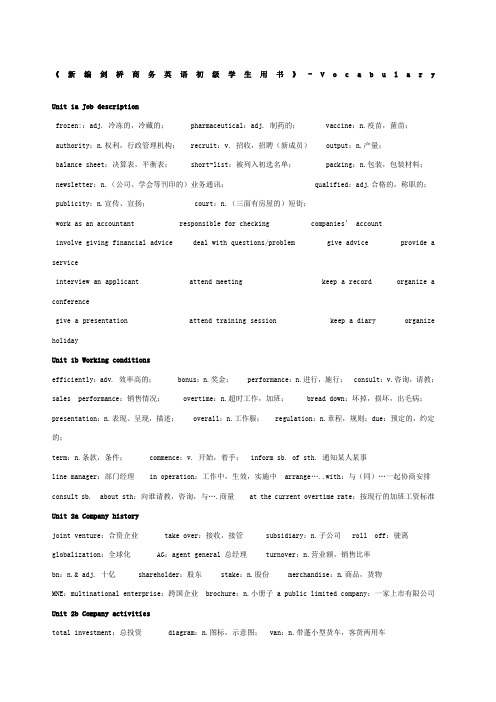
《新编剑桥商务英语初级学生用书》-V o c a b u l a r yUnit 1a Job descriptionfrozen::adj. 冷冻的,冷藏的; pharmaceutical:adj. 制药的; vaccine:n.疫苗,菌苗;authority:n.权利,行政管理机构; recruit:v. 招收,招聘(新成员) output:n.产量;balance sheet:决算表,平衡表; short-list:被列入初选名单; packing:n.包装,包装材料;newsletter:n.(公司、学会等刊印的)业务通讯; qualified:adj.合格的,称职的;publicity:n.宣传、宣扬; court:n.(三面有房屋的)短街;work as an accountant responsible for checking companies’ accountinvolve giving financial advice deal with questions/problem give advice provide a serviceinterview an applicant attend meeting keep a record organize a conferencegive a presentation attend training session keep a diary organize holidayUnit 1b Working conditionsefficiently:adv. 效率高的; bonus:n.奖金; performance:n.进行,施行; consult:v.咨询,请教;sales performance:销售情况; overtime:n.超时工作,加班; bread down:坏掉,损坏,出毛病;presentation:n.表现、呈现,描述; overall:n.工作服; regulation:n.章程,规则;due:预定的,约定的;term:n.条款,条件; commence:v. 开始,着手; inform sb. of sth. 通知某人某事line manager:部门经理 in operation:工作中,生效,实施中 arrange…..with:与(同)…一起协商安排consult sb. about sth:向谁请教,咨询,与….商量 at the current overtime rate:按现行的加班工资标准Unit 2a Company historyjoint venture:合资企业 take over:接收,接管 subsidiary:n.子公司 roll off:驶离globalization:全球化 AG:agent general 总经理 turnover:n.营业额,销售比率bn:n.& adj. 十亿 shareholder:股东 stake:n.股份 merchandise:n.商品,货物MNE:multinational enterprise:跨国企业 brochure:n.小册子 a public limited company:一家上市有限公司Unit 2b Company activitiestotal investment:总投资 diagram:n.图标,示意图; van:n.带蓬小型货车,客货两用车assembly plant:装配厂 extract:n.摘录,选段 grant:n。
BEC初级讲义 第一章
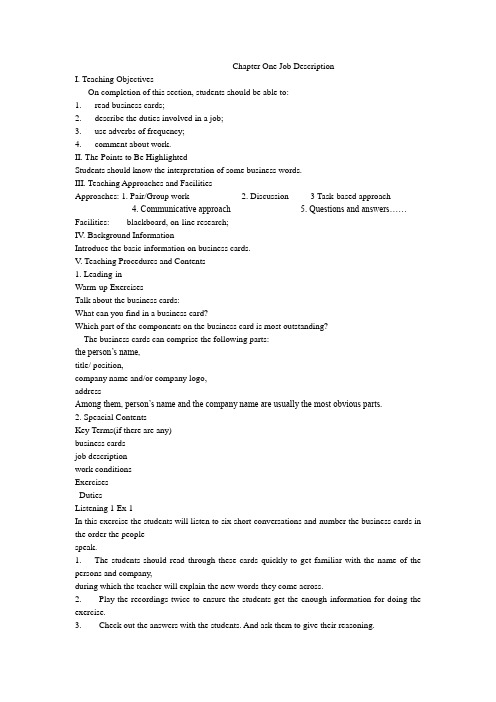
Chapter One Job DescriptionI. Teaching ObjectivesOn completion of this section, students should be able to:1. read business cards;2. describe the duties involved in a job;3. use adverbs of frequency;4. comment about work.II. The Points to Be HighlightedStudents should know the interpretation of some business words.III. Teaching Approaches and FacilitiesApproaches: 1. Pair/Group work 2. Discussion 3 Task-based approach4. Communicative approach5. Questions and answers…… Facilities: blackboard, on-line research;IV. Background InformationIntroduce the basic information on business cards.V. Teaching Procedures and Contents1. Leading-inWarm-up ExercisesTalk about the business cards:What can you find in a business card?Which part of the components on the business card is most outstanding?The business cards can comprise the following parts:the person’s name,title/ position,company name and/or company logo,addressAmong them, person’s name and the company name are usually the most obvious parts.2. Speacial ContentsKey Terms(if there are any)business cardsjob descriptionwork conditionsExercisesDutiesListening 1 Ex 1In this exercise the students will listen to six short conversations and number the business cards in the order the peoplespeak.1. The students should read through these cards quickly to get familiar with the name of the persons and company,during which the teacher will explain the new words they come across.2. Play the recordings twice to ensure the students get the enough information for doing the exercise.3. Check out the answers with the students. And ask them to give their reasoning.4. Replay the recordings and point out the clues to the answer.Conversation 1: Katy said ―I work for an IT company. I’m a consultant.‖This sentence give us two clues to card one: the type of company and the position of the person. Conversa tion 2: Robin said‖ I work for a large pharmaceutical company. I’m the head of the Marketing Department‖These words tell us about the company (pharmaceutical company) as well as Robin’s position (human resourcesmanager).Listening 2 Ex 2—Ex 31. The students will be asked to talk briefly about these people’s duties, eg. to guess the things they do in their dailywork.2. The teacher organizes the students to discuss about the Human Resources Manager’s duties and those of theMarketing Manager.3. Play the tape twice for the students to gain the general ides.4. Play the tape again and ask the students to note down the duties.1) a Marketing Manager’s duties a re:to help develop productsto discuss new products with clients ( to promote the products)to deal with designers and printersto deal with the local authoritiesto travel a lotto organize press conferences2) a Human Resources Manager’s duties are:to recruit peopleto write job advertisementsto choose the applicants to interviewto interview the applicants with the department managerto contact successful and unsuccessful candidatesto deal with employees’ problemsto inform employees if the management isn’t satisfied with their workEx 41. The person who attend ― sales meetings‖ must be Thomas Kingsley, because he is a sales executive.2. Because there is something to do with‖ advertising‖ for the ―product‖, it must be related with the marketing manager,Helen Marsden.3. ―Update our current network‖ is something done by Katy Williams’s company, since she works for an IT company.Besides, her works as a consultant, so she is responsible for providing recommendations.Talking about your jobEx 1 Vocabulary1. ―Work as‖ should be followed by a position.2. We usually say ― be responsible for doing/sth.‖3. If a verb follows the word ―involve‖, it should be in the –ing form.4. ―Base in‖ means the headquarters of a company is in some place.Comments about workEx 1 Reading1. The students read the questions one by one.2. Six of the students will be asked to read the notes.I usually answer the phone when it rings in our department but the calls are rarely for me. It’s really annoying.We get our bonus annually. I’d prefer it m onthly.We meet weekly to discuss sales performance. That’s to often.We frequently run out of stationery in our office. There doesn’t seem to be a sensible system for orderingsupplies.We often work late at the office but we never get overtime pay.The equipment sometimes breaks down when I’m giving a presentation. It’s always so embarrassing.3. The students answer the questions.Ex 2—3 V ocabulary and Grammar1. The students arrange the adverbs according to their frequency.2. The students make up sentences with these adverbs.3. The teacher points out the placement of the adverbs of frequency in sentences.Terms and conditions of employmentEx 1 Vocabulary1. Since most of these words are mentioned in Ex 1 and it is a task of matching the word with its meaning, thestudents can do it by themselves.2. Ask one student to read the meaning and another students tell the corresponding word. The students who tellthe most can get a prize.Ex 2 Reading1. The students read the material and finish the exercise in ten minutes.2. Point out some difficult points :―Week commencing‖ means the ―week that starts from‖.―Uniform‖ is the clothes of soldiers or policemen.3. Task DesignHow to introduce yourself and your job?How to design your business cards?4. Practical ExercisesImage your ideal job and introduce yourself.VI. AssignmentsDo self-study of Unit 1.Go over the main points listed in the learning objective. VII. Reference Material。
商务英语初级-1
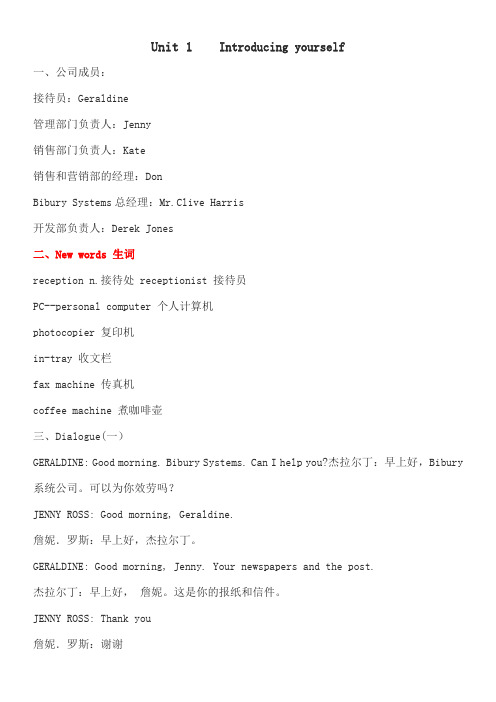
Unit 1 Introducing yourself一、公司成员:接待员:Geraldine管理部门负责人:Jenny销售部门负责人:Kate销售和营销部的经理:DonBibury Systems总经理:Mr.Clive Harris开发部负责人:Derek Jones二、New words 生词reception n.接待处 receptionist 接待员PC--personal computer 个人计算机photocopier 复印机in-tray 收文栏fax machine 传真机coffee machine 煮咖啡壶三、Dialogue(一)GERALDINE: Good morning. Bibury Systems. Can I help you?杰拉尔丁:早上好,Bibury 系统公司。
可以为你效劳吗?JENNY ROSS: Good morning, Geraldine.詹妮.罗斯:早上好,杰拉尔丁。
GERALDINE: Good morning, Jenny. Your newspapers and the post.杰拉尔丁:早上好,詹妮。
这是你的报纸和信件。
JENNY ROSS: Thank you詹妮.罗斯:谢谢CLIVE HARRIS: Good morning, Jenny. Good weekend?克莱夫.哈里斯:早上好,詹妮。
周末过的好么?JENNY ROSS: Excellent, thank you.詹妮.罗斯:非常好,谢谢。
CLIVE HARRIS: It is cold this morning.克莱夫.哈里斯:今天上午真冷。
JENNY ROSS: Yes. Very cold.詹妮.罗斯:是的。
真的很冷。
CLIVE HARRIS: Good morning, Geraldine.克莱夫.哈里斯:早上好,杰拉尔丁。
GERALDINE: Good morning, Mr. Harris. Your newspaper and your post. 杰拉尔丁:早上好,哈里斯先生。
BEC初级Module1
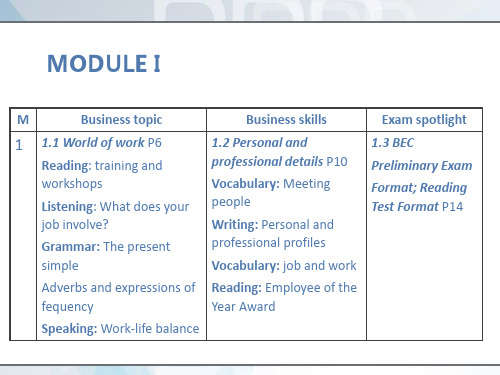
A typical company structure
New words and Expressions Exe. 5
involve vt. 包含、需要、使成为必要部分 responsibility n. 责任,所负责的事情 be responsible for sb./ sth. 对某人/某事负责 title n. 头衔,职称 sample n. 样品 试用产品 account n. 账目,账户 correspondence n.(来往的)信件
Award 1. Vt. 授予;把…赠与:
to award a prize for the best essay 授予最佳论文奖
The degree of B.A. was awarded to her.
她被授予文学士学位。
2. N. 奖赏,奖品
award ceremony 颁奖仪式,颁奖典礼
New Words & Expressions
finance assistant 财务助理 audit vt. 审计['ɔ:dit]
master’s degree 硕士学位
Business Administration 工商管理
judo ['dʒu:dəu] n.柔道 Chronic Fatigue Syndrome 慢性疲劳综合症['krɔnik] [fə'ti:ɡ] ['sindrəum; -drəm-] ambitious[æ m'biʃəs] adj. 雄心勃勃的
be based in = be located in ‚ 位于‛; b e b a s e d i n s o m e w h e r e He is a founding partner of the league based in New York City.他是那个位于纽约的联盟的组成成员之一。
新编剑桥商务英语初级-Module1
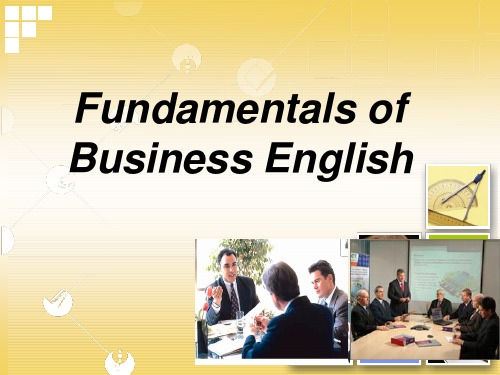
4 Complete the conversation with the sentences in the box.
It’s a real pleasure to work with her. Nice to meet you, Ian. Do you know her? May I introduce myself? My boss is in Sydney. She’s in Singapore, too.
Fundamentals of Business English
Module 1 Business Skills
1.2 Personal and professional details
1.2 Personal and professional details
Personal and professional profiles Writing
Favourite destination for holidays _________________________
Reasons for learning English _____________________________
MODULE I.II
BUSSINESS SKILLS
8 With your partner, work with another pair of students. Introduce your partner to the other people in the group, using the information in exercise 7. Listen to the other presentations. Ask a follow-up question to each person. Do you like living in …?
新编剑桥商务英语unit1PPT教学课件
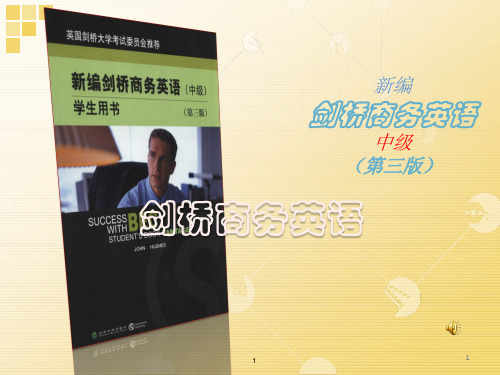
I wish I had my own space. I have to carry everything around in my bag and sometimes there’s nowhere to sit.
hot-desking
18
I like it because it’s only for a couple of months and I’m saving up to go round the world.
temping
19
The only problem is sleeping. Your body never knows if it’s night or day!
shift-work
20
It can get a bit lonely at times. And I miss my colleagues and all the office gossip.
6
弹性工作时间(flexitime),亦作flextime 或 flexible working hours ,就是将员工工 作时间分为核心时间和弹性时间。核心时间(例 如早上10点到12点,下午2点到4点)为员工必 须工作时间,其余时间定为弹性时间,即员工自 己选择的工作时间, 这样员工可灵活决定上下班 时间。员工每天工作时间相同(例如每天8小 时),但实际到公司上班的时间每天不同。
0 freelance
B You sell your work or services to a number of different companies.
1 teleworking 2 job-sharing 3 shift-work
C You work for different companies for a short time without a permanent contract.
BEC剑桥商务英语 Unit_1
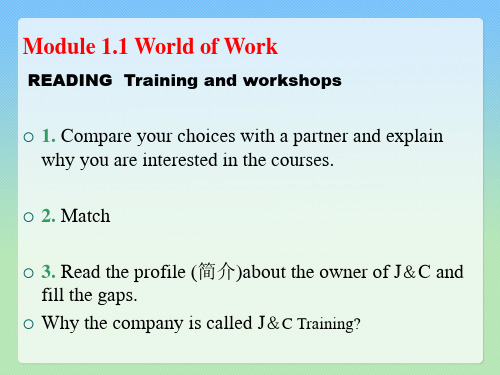
company efficiency product development mentor represent supervise scuba diving raise money audit Chronic Fatigue Syndrome detective story research and development chewing gum
5. Listen to the conversation and check your answer.
(1) May I introduce myself? (2) Nice to meet you, Ian. (3) My boss is in Sydney. (4) Do you know her? (5) She is in Singapore, too. (6) It’s a real pleasure to work with her.
Prioritize tasks Set aside one night each week for recreation Seek professional help
பைடு நூலகம்
1.2 Personal and professional details
VOCABULARY Meeting people
1. key:
1. 2. 3. 4. 5.
6.
does, produce, makes do, employ, have Do, export, ship Do, have, don’t hold Do, start, begin Does, help, doesn’t have
Grammar: Adverbs and expressions of frequency
新编剑桥商务英语unit_1
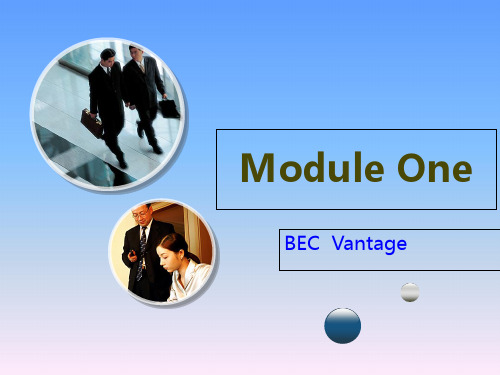
Key Points
➢Topic analysis:job-share
1 guide to… 2 make it work 3 share credit and blame 4 Flexecutive 5 consultancy 6 “We had been over-optimistic. I did manage to find someone else who fitted in with me, but I was very lucky.” 7 play to 8 manage 9 parental leave
Hard to progress your career
No job security
flexitime
Good for work-life balance
Hot-desking Saves the company
money
Not good for people who like routine
Disruptive to employees
弹性工作(上班)时间 办公桌轮用 办公室小道消息 赞扬,功劳 总裁,总经理 智能 作最坏打算的,为最坏
情况的 事态,局面 全日制的 授权,分派工作
Useful Words and Expressions
availability job-sharer parental-leave distractions contact case-load daily-log voice mail self-organization disruptive
)
办公桌轮用制 Hot desking
Hot desking这个说法据说是来源于海军的一个惯常做 法,叫hot racking,也就是不同班次的水手共用几个 休息铺位。 上班需要一直待在办公室的人们大概都有 专属于自己的办公桌,而那些大部分工作都不需要在办 公室完成的人们,就算有个办公桌也没什么时间享用。 所以,现在很多地方都流行hot desking,同一个办公 桌可能从周一到周五的主人都不同。
BEC剑桥初级-1

BEC剑桥初级-1LISTENING Approximately 40 minutes (including 10 minutes' transfer time)PART ONEQuestions 1-8For questions 1-8, you will hear eight short recordings.For each question, mark one letter (A, B or C) for the correct answer.Example:Who is Emily going to write to?A.the staff B. the supplier C. the clientsThe answer is A.After you have listened once, replay each recording.1. What is the man's title?A. Personnel ManagerB. DirectorC. General Manager2. Which graph is correct?3. Which is the flight to Hong Kong?A. LH4521B. LH4152C. LH41254 Which department has a vacancy at the moment?A PersonnelB SalesC Production5. When does the plane take off?A. 4:25B. 4:35C. 4:456. What does the woman want?A. an accountB. moneyC. check7. Which machine are the people talking about?A. A fax machineB. A printerC. A photocopier8. Where does Hugh work?A. JapanB. KoreaC. EnglandPART TWOQuestions 9-15Look at the notes below. Some information is missing. Y ou will hear a woman ordering some electrical equipment.For each question (9-15), fill in the missing information in the numbered space using a word, numbers or letters. After you have listened once, replay the recording.BRIDGE ELECTRICALTelephone orderItem: (9) Belmont ______.Customer: (10) Ann _______Model number:. (11) ______Delivery address: (12) 22 ______(13) on the ______.Delivery day: (14) ______Today: (15) send a _______PART THREEQuestions 16-22Look at the notes about the qualities of great managers. Some information is missing. Y ou will hear part of a presentation by a professor of management.For each question (16-22), fill in the missing information in the numbered space using one or two words. After you have listened once, replay the recording.Qualities of Great Managersaccept (16) ______.know how to give (17) ______ properlycriticize (18) poor ______find out (19) customers'______.see (20) ______learn (21) _______look out for (22) higher-level______PART FOURQuestions 23-30Y ou will hear a conversation between a head of department and an employee.For each question (23-30), mark one letter (A, B or C) for the correct answer. After you have listened once, replay the recording.23. The biggest problem with the computer, is thatA. it is difficult for her to know the program well .B. it regularly stops working.C. the monitor is too small.24. Sharon would like the company to buy ______.A. new software.B. new computers.C. new machines.25. When dealing with complaints, she would like to _______.A. take more responsibility.B. pass the customer on to her boss.C. didn't care for.26. Sharon's boss thinks that some customers _______.A. often receive faulty orders.B. are often honest.C. are not always honest.27. Sharon's main aim for next year is to _______.A. raise the sales of the company.B. make fewer mistakes.C. learn more about the products28. Sharon started working for the company _______.A. next year.B. one year ago.C. over a year ago.29. Sharon found out about the vacancy from _______.A. his colleague.B. a newspaper.C. an internal memo.30. Sharon does not enjoy _______.A. attending meetings.B. typing invoices.C. preparing price lists.Y ou now have 10 minutes to transfer your answers to your Answer Sheet.Tape scripts:TapescriptListening Test 1This is the Business English Certificate Preliminary, Listening Test 1.Part One. Questions 1 to 8.For questions 1-8, you will hear eight short recordings. For each question, mark one letter (A, B or C) for the correct answer. After you have listened once, replay each recording.[pause]One: What is the man's title?[pause ]M: OK. Let's look at the new organization of the company. Can everybody see that?W: Yes.M: At the top here we have the General Manager and he has six people who report to him. There's the Director responsible for strategic coordination. Then there's me. I'm responsible for development and marketing. Then there's the Production Director, the Financial Director, the Personnel Manager and the Pharmaceutical制药学的Director. Any questions?W: No, thank you.[pause ]Two: Which graph is correct?[pause ]W: Now, look at it in detail. In the first six months, the sales volume of K71 reached to 170 million dollars and K73 rose to 150 million dollars, which are not easy considering they had dropped below 1 million at the end of last year, but our new product K75 did not sell well as predicted, only 100 million.[pause]Three: Which is the flight to Hong Kong?[pause]W: Would all passengers for flight LH 4521 to Brisbane please go to gate number 40. Flight LH 4152 to Hong Kong is now also boarding at gate number 42.[pause]Four: Which department has a vacancy at the moment ?[pause ]M: Good morning. Simens.W: Oh, hello. I saw in the paper last week that you've got a vacancy for a secretary in your production department.M: Well, actually that vacancy was in the personnel department but the position's filled now. We are looking for a secretary in the sales department, though.W: Thanks, but I'm sorry, I'm not interested in this position.[pause]Five: When does the plane take off?[pause]M: Do you know when the plane take off?W: It has been arranged to take off at four fifteen but it's delayed thirty minutes.[pause]Six: What does the woman want?[pause]W: I'd like to cash this check.M: Y ou can do that only if you have an account with us. Do you have one?[pause]Seven: Which machine are the people talking about?[pause]M: Karen, Could you help me for a moment?W: Sure. What's the problem?M: I'm not sure how to use this machine.W: It's very simple. Just insert the paper, key in the number and press the send button. [pause]Eight: Where does Hugh work?[pause]M: And how's the weather in London?W: Mmm, yeah, fine...M: Look, I'm afraid I must cut it short. There's another call waiting for me to answer.W: Okay, Hugh, I'm coming out to South Korea next week, so I'll stop over in Tokyo and we can talk. Cheers then; bye now.M: Bye. Looking forward to seeing you again.[pause]That is the end of Part One.[pause ]Part Two. Questions 9 to 15.Look at the notes below. Some information is missing. Y ou will hear a woman ordering some electrical equipment.For each question 9-15, fill in the missing information in the numbered space using a word, numbers or letters. After you have listened once, replay the recording. Y ou have ten seconds to read through the notes.[pause]Now listen, and fill in the missing information.W1: Hello. Bridge Electrical.W2: Hello. I'm from the Golden Restaurant. I'd like to place an order for a Belmont freezer. I saw one in the showroom this morning.W1: Oh, right. Have you got the model number?W2 : Yes. 2436.W1: Thanks. Can I take your name, please?W2: Y es, Ann Thurrock. T-H-U-R-R-O-C-K.W1: And the address for delivery, please.W2: Y es. It's Museum Street No. 9.2. It's on the corner.W1: Thank you. I will check when we can deliver. Y es. How about Wednesday in the morningW2: Y es. That's fine.W1: OK, We'll do that. Do you have any account with us?W2: No. I'll send you a check today.W1: Fine. That's all arranged then.W2: Thank you for your order.W1: Thank you.[pause]Now listen to the recording again.[pause]That is the end of Part Two. Y ou now have ten seconds to check your answers.[pause]Part Three. Questions 16 to 22.Look at the notes about the qualities of a great manager.Some information is missing. Y ou will hear part of a presentation by a professor of management. For each question 16-22, fill in the missing information in the numbered space using one or two words. After you have listened once, replay the recording. Y ou have ten seconds to read through the notes.[pause]Now listen, and fill in the missing information.[pause]M: Many people today ask how they can become a great manager. My lecture today will discuss some essential qualities of a great and effective manager.Generally, a good and effective manager should be very good at the following essential tasks. First, great managers accept blame. When someone from head office visits and expresses displeasure, the great manager immediately accepts full responsibility. In everyday working life, the best managers are constantly aware that they selected their people and should have developed them. Errors made by team members are in very real sense their responsibility. Second, great managers give praise. Praise is probably the most under-used management tool. Great managers are forever trying to catch their people doing something right and congratulating them on it. And when praise comes from outside, they are swift not merely to make the fact known, but to make clear who has earned it. Managers who regularly give praise are in a much stronger position to criticize or reprimand训斥, 斥责poor performance. Moreover, great managers put themselves about.(put about: give other people information or news) Most managers now accept the need to find out not merely what their team thinks, but what the rest of the world, including their customers' need. So MBWA, i.e. management by walking about, is an excellent thing.Another important point is that great managers exploit strengths, not weaknesses in themselves and in their people. They see strengths in themselves as well as in other people, as things to be built on, and weaknesses as something to be accommodated,调节, 使适应and if possible, eliminated. The last but not the least, great managers make themselves redundant.多余的What great managers do is to learn new skills and acquire useful information from the outside world, and then immediately pass them on, to ensure that if they were to be run down by a bus, the team would still have the benefit of the new information. So great managers are always on the lookout for higher-level activities to occupy their time, while constantly passing on tasks that they have already mastered.[pause]Now listen to the recording again.[pause]That is the end of Part Three. Y ou now have twenty seconds to check your answers.[pause]Part Four. Questions 23 to 30.Y ou will hear a conversation between a head of department and an employee.For each question 23-30, mark one letter (A, B or C) for the correct answer. After you have listened once, replay the recording. Y ou now have forty-five seconds to read through the questions.[pause]Now listen, and mark A, B, or C.M: Come in, Sharon and take a seat.W: Thanks.M: So, where do we start? Should we begin with a look at last year and then go on from there? W: Fine.M: So, how do you feel you've done in your first full year with the company?W: Overall, I think I've done quite well. I feel quite confident now about what I do.M: And are you happy with your duties?W: Well, the job is exactly as it was advertised in the paper, so there have been no surprises. I like dealing with customers and I don't mind answering the phone and preparing invoices.发票Sometimes it's a bit boring typing long price lists, but then everyone has to do it.M: That's true. Does anything make your job difficult?W: The computer. To begin with, I was slow because I didn't know the program, but now I get annoyed when the computer just stops working for no reason. I often sit looking at the monitor for minutes, not sure whether it is still working or not. I think the network is too old for our software and we need some new machines.M: But apart from the computer, is there anything else you would like to change?W: Er, let me see. I'd like the authority to issue credit notes 贷项清单; 赊欠清单without having to ask you first. Y ou're often away on business and sometimes customers ring up with a complaint. And if we can't contact you, then we can't deal with the complaint properly. It's a bit embarrassing at times.M: Y es, but some of our customers always find something wrong and try and get a credit note with every order. Y ou can't believe everything they say, you know. What about your objectives目标for the future?W: Well, I need to get to know the customers a bit better and maybe try to make fewer mistakes. But I think the most important thing is to increase my product knowledge, so I don't get embarrassed when customers make enquiries.M: Don't worry, you'll learn all that in time. What I'd like to ask you about now is...[pause]Now listen to the recording again.[pause]That is the end of Part Four. Y ou now have ten minutes to transfer your answers to your Answer Sheet.[pause]Note: Teacher, stop the recording here and time ten minutes. Remind students when there is one minute remaining.That is the end of the test.Key:Part I1-8 BBBBC BAAPart II9. freezer 10. Thurrock 11. 2436 12. Museum Street No. 92 13. corner 14. Wednesday 15. checkPart III16. blame 17. praise 18. performance 19.need20. strengths 21. new skills 22. ActivitiesPart IV23-25 BBA26-30 CCBBC。
初级商务英语听力unit-1-meeting-peoplePPT课件
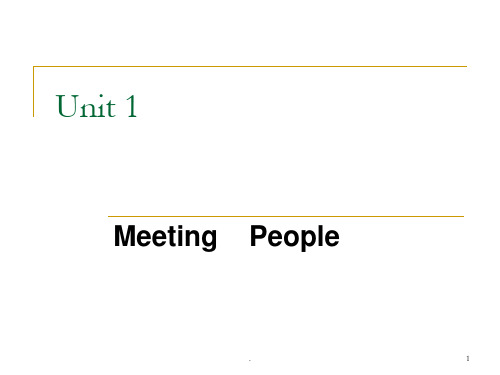
.
4
2 Greeting
It is common for people to greet and introduce each other in business world. Therefore, it is the first step to communicate with people by learning to greet and make introductions. Greeting is a way of being friendly and polite to someone. People may use different ways of greeting in different situations.
B Listen to the six questions again and write down each of them.
.
8
3Introducing People
Greeting can also be seen as a way of starting a conversation. After greetings, it is very common for people to make introductions to those they meet for the first time.
Make a group of three and role play the three famous people mentioned in 3.2 in this unit. Read all of their personal information cards carefully. Suppose three of you meet at an international business conference. Please greet each other, introduce yourselves and then have a small talk. After the first round, exchange roles. The following language focus may be helpful.
BEC商务英语Unit 1.1

shift work
Shift
work is an employment practice designed to make use of the 24 hours of the clock, rather than a standard working day. The work shift is the time period during which a person is at work. 轮班工作;倒班, 换岗
Temping- Disadvantage:
low
salary, security; hard to progress your career
temping
would
you be willing to do temporary work? Why or why not?
temping
commuting; can work for remote companies ? ?
tele-working:disadvantages
social
contact; internet support ? ?
teleworking
would
you be willing to telework? Why or why not? what is important when teleworking?
Freelance: Disadvantages
Stability:
your work is not stable as work in a set company Salary: your salary may lower Security: run high risk of losing jobs
- 1、下载文档前请自行甄别文档内容的完整性,平台不提供额外的编辑、内容补充、找答案等附加服务。
- 2、"仅部分预览"的文档,不可在线预览部分如存在完整性等问题,可反馈申请退款(可完整预览的文档不适用该条件!)。
- 3、如文档侵犯您的权益,请联系客服反馈,我们会尽快为您处理(人工客服工作时间:9:00-18:30)。
商务英语BEC初级UNIT1First meetings 1introductions and greetings1. Listening You are going to hear a number of people introducing themselves. Some of the introductions involve two people, some involve three. First look at the conversations in the pictures below. Then, as you listen, number these conversations in the order you hear them. The first one has been done for you.a.( ) A: Hello, I'm...B: Nice to meet you. My name's...b.( ) A: Hello, let me introduce myself. My name's...B: Pleased to meet you. I'm...c.( ) A: I don't know anyone here. You'll have to introduce meB: Of course, Roger ,this is...C: Nice to meet you.d.( ) A: How do you do? My name's...B: Nice to meet you. Mine's...e.( ) A: I haven't met your Managing Director yet.B: Oh, I'm sorry. Dr. Mannheim, this is .C: Very nice to meet you.f.( ) A: Let me introduce you two. Maxine, this is Francis.B: Nice to meet you.g.( ) A Could you introduce me to the Marketing Manager?B: Of course, John...Philip, let me introduce you to ...C: Nice to meet you.Listening task(1) A: Hello, let me introduce myself. My name's Klein, Gunther Klein.B: Pleased to meet you. I'm Geoff Snowdon.(2) A: How do you do? My name's Paul Matthews.B: Nice to meet you. Mine's Akira Mishima.(3) A: Hello, I'm Tom.B: Nice to meet you. My name's Francine.(4) A: Peter, could you introduce me to the Marketing Manager?B: Of course, John...Philip, let me introduce you to john, our new Computer Manager.C: Nice to meet you, John, we're going to be working together.(5) A: Herr Tubingen, I haven't met your Managing Director yet.B: Oh, I'm sorry. Come and meet him. Dr Mannheim, this is Mr. Roberts. He's over from the States on a visit.C: Very nice to meet you, Mr. Roberts. How long are you here for?(6) A: Jane, I don't know anyone here. You'll have to introduce me.B: Of course, I'll introduce you to Roger first. He's the host...Roger, this is Susan. She's just moved to the area.C: Nice to meet you, Susan. Do you come from these parts?(7) A: Let me introduce you two. Maxine, this is Francis.B: Nice to meet you, Maxine. Are you an old friend of Tony's?C: Oh yes, Tony and I have known each other for years, haven't we?A: Yes, that's right.2.Prisentation Introductions often include thes steps:You heard two types of introduction:GreetingOr } introduction --> responserequest for introductionYou head two types of introduction:introducing yourselfintroducing some one elseNotes:1. Some introductions are more formal than others. The use of first names indicates informality.2. In English-speaking cultures, peolle usually shake hands on first meting.Now listen again and indicate whether the introdcution is formal(F) or informal(I). The first one has been done for you.Introduction 1 ( F) Introduction 2 ( )Introduction 3 ( ) Introduction 4 ( )Introduction 5 ( ) Introduction 6 ( )Introduction 7 ( )3. Contralled practiceComplete the introductions.(1). Peter King introduces himself to Jack Simpson:Peter King: Hello, My name's Peter KingJack Simpson: I'm Jack Simpson.(2). Philip introduces Sarah to James:Sarah: Philip, I Here. You'll have to .Philip: Of , I'll to James. He's an old friend of mine.James, Sarah, she's just joined the company.James: ,Sarah. Where do you come from?(3). Rod Burton introduces Pete Taylor to an important custome:Pete: Rod, I Mrs Rogers, the Purchasing Manager from Kentons.Rod: I'm . Come and meet her. Mrs Rogers, Pete Taylor, our Export Sales Manager.Mrs Rogers: What countries do you cover?(4). Klaus Fischer introduces himself to an American visitor:Klaus Fischer: How ? MyAmerican: . Brenda Cole.课文注释及词汇讲解* We are going to be working together.我们将在一起工作。
该句用的是将来进行时,意义相当于一般将来时,即该句也可以说成:We are going work together. 用将来进行时目的是语言更加形象生动。
中国学生往往不敢用将来进行时。
其实该时态用法与一般将来时基本一样,而且能丰富我们的表达方式,也更符合口语习惯。
eg. I will beworking in New York next month.我下个月将到纽约去工作。
* have to 不得不,必须must的意思也是"必须"。
两者的区别为:have to 是一种客观要求。
must 为主观认为。
eg. According to the contract[合同] wehave to pay by L/C[信用证]根据合同规定,我们必须以信用证付款。
[合同条款是客观要求]"You must pay us by L/C," said the exporter."你们必须以信用证付款,"出口商说。
[某人的要求是主观的]* over (adv.)(跨过一定空间)到.............eg. He's over from the States on a visit.他从美国来访。
* the States 指美国[注意:首字母要大写并且要在词尾加-s表复数]* be on a visit 在访问中介词on在这里指"在从事……中;处于……情况中"。
eg. I'm here on business. 我来这儿出差。
